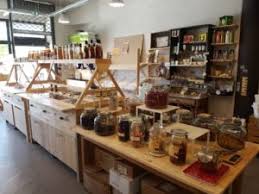L'Effet Bocal
Sustainable supply

![]() FRANCE
FRANCE
Web: www.leffetbocal.fr
Contact: contact@leffetbocal.fr
Location: Poitiers, France
Sector: M-T, Sales and services
Date of creation: project launched in 2017
Analysis by the association: March 2018
A grocery store without packaging and a space of creative workshops dedicated to « zero waste » life.
overview
In 2015, Maryse and Mathilde, the two founders of the project, met at a time when it was difficult for both of them to fullfill in their respective jobs. By taking a distance from their daily lives and starting to convert to a zero waste lifestyle, they asked themselves this question: “What do we miss everyday to adopt a zero waste way of life ?”. And the answer was: a unique place of alternative supply.
For a year and a half, they have traveled the region to find the best producers and co-build sustainable supply systems and eco-packaging¹. In 2017, they then founded L’Effet Bocal, an unpackaged grocery store and a space for creative workshops dedicated to life (almost) Zero Waste.

- 700 different products offered in the store,
- 70 producers involved in this process,
- 80 customers per day on average.
- Sustainable supply
- Responsible consumption
- Industrial and territorial ecology
presentation of the circular economic approach
Producers deliver their products every week to the grocery store and organize co-location tours² if they live close to each other. Maryse and Mathilde regularly fill the jars and the stainless steel bins of the store with the delivered products. Delivery packaging (cans, boxes, etc …) are washed and recovered at each tour by the producers to be reused for the next delivery.

The grocery products are seasonal, local (85% of them come from the Vienne and the Deux-Sèvres) and if possible, organic (more than 50% of the proposed products).
Customers bring their containers (jars, boxes, sachets …) and use the bulk products with the help of stainless steel utensils. Reservoir jars (jars of jam, etc …) are provided in case of forgetfulness. This provision is free, the goal is not to charge the customer but to encourage him to come the next time with his own containers.
Here, customers are not pushed to consume more, on the contrary, they are sensitized to consume in just quantities. Almost all prices are fixed per kilo, no need to fill the bottle of oil to the brim!

From the hygiene side, nothing to complain about, the jars are cleaned before each new use and the shop is immaculate.
In order to have (almost) no loss, they have implemented several tips:
- have the “compass in the eye” to order from the producers the quantities just needed. Sometimes there are breaks in some products. In this case, they simply explain to their customers that there is no more for now.
- they cook the remains or unsold for their personal consumption,
- they give the food leftovers to their animals.

The grocery store is also an alternative place where workshops and meetings are held every week: “How to make your own laundry?“; “Wellness Workshop: Japanese Philosophy, how do they stay zen? “…
sustainable approach
The observed benefits revolve around:
- Reduction of waste (especially plastic packaging) thanks to the reuse of containers,
- Reduction of the carbon footprint due to transport via a local supply and coportage,
- Valorization of organic farming and responsible consumption.
- Reduction of raw material costs thanks to:
- Bulk purchase;
- Short-haul transportation and coporting
- Low economic losses thanks to the good management of quantities and unsold goods: only € 100 of economic losses per week.
This initiative allows:
- The gathering of consumers and producers through the discovery of local products,
- The valorization of local agricultural employment,
- The awareness of citizens to “zero waste” and their health through workshops “homemade” (example: manufacture of cosmetics) and workshops “well-being”.
replicability & future perspectives
This initiative seems easily replicable, nevertheless certain conditions must be respected:
- Installation of the grocery store near areas both urban (place of consumption) and agricultural (place of production),
- Co-construction of the project with local actors for the establishment of sustainable supply,
- Sensitization of the local population to responsible consumption.
- The company Le comptoir des Lys, providing cleaning products and cosmetics, does not take back its packaging (thick plastic cans),
- Wine bottles are not consigned, as there is no washing company nearby,
- Yogurt pots are plastic because there is no local glass production,
- For now their income is quite low, which can be explained by the current income of the two weak co-founders: salary of about 600 € / month / pers. This is due to the recent opening of the store (10 months ago), low margins on products (purchase of quality products from non-intensive agriculture at high purchase price and sale at reasonable prices for stay competitive) and the small size of the store. However, they aim to double their income in June 2018, when they stop receiving unemployment benefits.
Glossary
- Eco-packaging¹ = biodegradable packaging.
- Coportage² = use of a single vehicle to transport the products of several suppliers for the purpose of optimizing movements.
- Carbon footprint³ = the carbon footprint represents the sum of all greenhouse gas emissions. greenhouse gas (GHG) attributable to a product, company or person to assess its potential impact on climate change.
